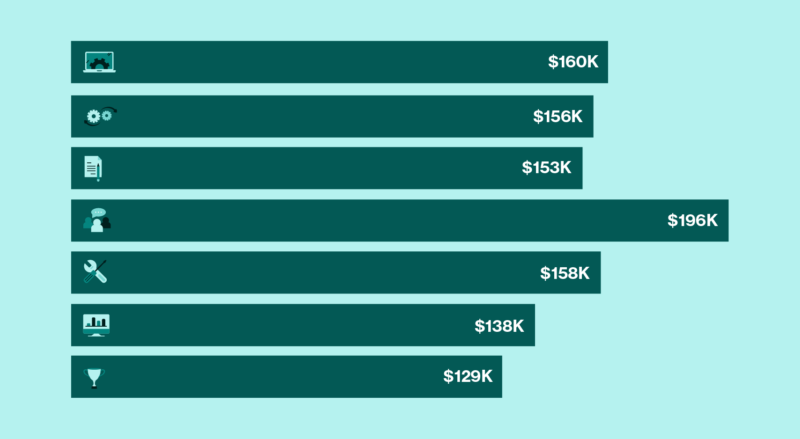
4 Ways Women Can Get the Salary They Deserve
Although we’ve made tremendous strides in gender equality, data shows we still have a long way to go, especially when it comes to pay. The gender wage gap represents the difference in salaries between men and women. Pew Research Center shared that it hasn’t changed much in the past two decades in the US. In fact, the gap is still narrowing so slowly that at its current rate, it’s not expected to close until 2088.
When it comes to equitable compensation, particularly as it relates to gender, one important piece of the puzzle is the fact that women, on average, ask for lower salaries than men. This is often referred to as the expectation gap.
Hired platform data tells us the wage gap has widened for all except white and Asian women, driven by a widening expectation gap. We also see Black women had the widest wage gap in 2021 and again in 2022.
When we surveyed tech talent, we learned only 25% of women, compared to 39% of men, felt they had adequate knowledge or resources to request compensation in line with the market, their role of interest, and their skills and experience. Nearly 25% of women admitted they need a lot of help in this area compared to 18% of men. Combined, 68% of men and women say they could use help, ranging from “some,” to “a lot.”
Glassdoor recently published research indicating some women they surveyed hesitated to negotiate salary offers.
The impact of salary transparency is promising
While still early in the journey, there is emerging evidence salary transparency is effective. More cities and states have initiated laws mandating the disclosure of salary bands to some degree. As a metropolitan area, New York City’s legislation became effective November 1, 2022. It requires employers to disclose the compensation or range in any ad for a job, promotion, or transfer opportunity.
In New York City, Hired’s data shows a positive effect, as the gender wage and expectation gap
narrowed. Representation also increased for women in NYC.
As companies and employees alike think about how to create a more diverse and equitable environment, addressing both the expectation and wage gaps should be a top priority.
Now, let’s dive into some of the key ways women can advocate for themselves and combat the gender wage gap.
1. Know your worth and advocate for itThe first step is understanding your own value in the job market. (As a reminder, companies are not allowed to ask about pay history during the interview process.) Research industry standards and salary benchmarks for your role and level of experience. You’ll find out what a fair salary should look like.
Armed with this knowledge, confidently negotiate your salary during job interviews and performance evaluations. Don’t shy away from discussing compensation, and be prepared to articulate your accomplishments, skills, and the value you bring to the organization. Remember, negotiation is a standard part of the hiring process, and advocating for fair compensation is not only acceptable but expected.
Women with specialized jobs may find accurate information on sites like PayScale, Glassdoor, and Hired’s Salary Calculator. These will provide valuable insights into salary ranges for similar positions in your geographical area. Consider asking about the company’s compensation philosophy and whether they publish their internal wage gap stats.
In addition, understand the potential for career progression with the company — and how salary growth mirrors this. This is an important part of evaluating whether the role can help you stay competitive from a salary perspective.
Related: How to Ask About Growth Opportunities During an Interview
Even if the initial salary offer is not exactly what you expected, you must be able to grow (both in terms of role and salary) within the company. This will put you in a better position when you make your next move.
Lastly, remember to calibrate for more than just salary as you’re negotiating with potential employers. Particularly as you progress in your career, additional factors beyond the cash compensation offer may become more valuable to you. These could be helpful leverage as you advocate for fair treatment.
Those in more senior roles, for example, may be offered significant amounts of stock compensation. While some companies won’t budge on their salary offer, you may be able to argue for a better overall compensation package by being flexible in your cash requirements.
2. Leverage your networkCultivate relationships with mentors, peers, and industry professionals who can provide guidance, support, and valuable opportunities. Attend networking events and industry conferences, and join professional associations relevant to your field.
Hired is a great resource as we regularly hold events and summits to support jobseekers in fostering connections with employers and fellow tech professionals. Keep an eye out for upcoming events.
Networking not only opens doors to new job opportunities but also provides access to insider information about salary trends, job openings, and negotiation strategies. Additionally, a strong network can serve as a source of encouragement and empowerment, helping you navigate the complexities of the workplace with confidence.
3. Don’t stop learningContinuously investing in your professional development not only enhances your skills and expertise but also increases your market value. Identify areas for growth within your field and seek out training programs, certifications, and workshops to expand your knowledge base.
By acquiring new skills and staying abreast of industry trends, you position yourself as a valuable asset to employers, deserving of competitive compensation. Moreover, demonstrating a commitment to learning and growth showcases your dedication to excellence and can bolster your negotiating power when discussing salary.
4. Seek out employers committed to pay equityWhen exploring job opportunities, prioritize organizations that demonstrate a commitment to pay equity and gender equality. Research prospective employers’ policies and practices related to compensation, diversity, and inclusion initiatives.
Look for companies that conduct regular pay audits, have transparent salary structures, and actively work to address gender disparities in pay. By aligning yourself with employers who value fairness and equality, you increase the likelihood of receiving the salary you deserve and contribute to broader efforts to close the gender pay gap.
Related: How to Identify Value-Driven Employers in the Job Search
Advocate for equitable treatment and equal payWhile much of the onus is on companies to be sure that they are paying both genders equally, women jobseekers can play an important role in narrowing the gender gap. If there’s a willingness to progress toward equality, women just need the information to get there.
By holding companies accountable, you not only position yourself to receive fair pay but also give the company a chance to rise to the occasion and combat the gender wage gap.
Create your free Hired profile and let top employers come to you.Originally published April 2017. Updated March 2024.
Related blog posts

7 Things to Never Say During a Salary Negotiation
Whether you’re looking for a new job or hoping for a raise in your current role, salary...

Which 7 Critical Factors Contribute to Your Compensation Offer?
Perhaps you’re waiting to receive a job offer and salary package. Or maybe you already have and...

Where Do Engineer Salaries Pay the Best (Highest) Standard of Living?
Opportunity shifts from higher cost-of-living markets The rise in remote work prompted...

When Asked Salary Expectations, What Should You Say to Recruiters?
Here’s a common scenario for jobseekers: You’re in an interview and the recruiter asks, “What are...

What Does Your Tech Salary Look Like? A Review of Salary Trends
When thinking about how your tech salary stacks up in this current hiring environment you’d...

Salary Negotiation 101: How to Know and Ask For Your Salary Worth
Salary negotiation is a difficult task for everyone. That goes for whether you’re just...
